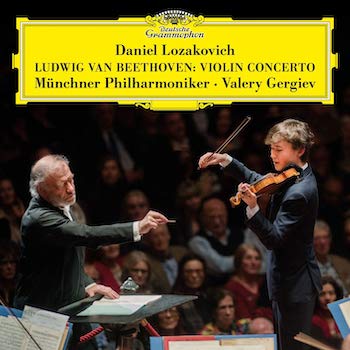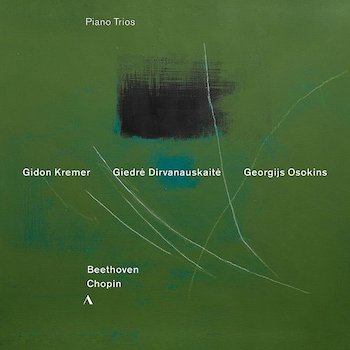Classical CD Reviews: A Banquet of Beethoven from Daniel Lozakovich, Midori, and Gidon Kremer & Friends
By Jonathan Blumhofer
Nothing to recommend in Daniel Lozakovich’s take on the Beethoven Violin Concerto, but Midori’s performance of the piece is completely unpretentious, natural, and exciting. Gidon Kremer & friends serve up a terrifically flexible version of Carl Reinecke’s adaptation of Beethoven’s Triple Concerto.
 There’s no question that Daniel Lozakovich is a fine violinist. His technique is brilliant and secure. His tone is sweet and appealing. Yet his interpretive sensibilities leave more than a little to be desired. That’s frustratingly apparent in his newest release, which pairs Beethoven’s epic Violin Concerto with the first movement of J. S. Bach’s G-minor Solo Violin Sonata.
There’s no question that Daniel Lozakovich is a fine violinist. His technique is brilliant and secure. His tone is sweet and appealing. Yet his interpretive sensibilities leave more than a little to be desired. That’s frustratingly apparent in his newest release, which pairs Beethoven’s epic Violin Concerto with the first movement of J. S. Bach’s G-minor Solo Violin Sonata.
Granted, the list of teenaged violinists who can convincingly pull off the Beethoven (and the Bach, for that matter), is short: Hilary Hahn is the only recent prodigy that comes to mind who managed the feat and has gone on to a stellar career. Lozakovich may well have the latter in front of him but there’s not much to commend this release.
His take on the Beethoven is frustratingly literal, especially in the big first movement. Here, Lozakovich’s playing is spotlessly in tune but lacking any sense of direction or excitement: nothing is shaped, no phrases tugged at, no spark of life to be found in any of his part’s runs or soaring melodic statements. His tempos aren’t exactly slow but they consistently feel deliberate. In all, it’s a rather limpid effort – certainly not an adjective one often can apply to this piece but…here we are.
The second movement comes across a bit better: the tempo doesn’t drag as much and Lozakovich’s hands-off approach suits the violin’s accompanimental gestures well enough. In the finale, though, despite playing of technical solidity, he doesn’t uncover any hidden secrets in this well-known piece.
Only during the outer-movement cadenzas does Lozakovich’s performance really come to life. Here his playing heats up (the finale’s cadenza is conspicuously fiery) and you’re left to wonder why that sort of attitude and approach are absent from the Concerto’s remaining 40-some minutes (as well as in the rather commonplace Bach “encore” that fills out the disc).
Perhaps Lozakovich was just echoing the Münchner Philharmoniker’s competent, but stolid, accompaniment. Certainly conductor Valery Gergiev doesn’t push soloist or orchestra too hard anywhere. Yes, textures are lean, everybody’s together, and the woodwinds sing nicely in the slow movement. But there’s no give-and-take between violinist and ensemble and the Münchner’s heavy-footed accompaniment ensures that the finale lacks the freewheeling exuberance the music demands.
Given the sheer number of great Beethoven Violin Concerto recordings out there, including some fairly weird approaches (see: Christian Tetzlaff and Anne-Sophie Mutter), there’s really nothing to recommend this one.

There is, on the other hand, much going for Midori’s new recording of the Violin Concerto with the Festival Strings Lucerne (FSL). Her timings aren’t that far off from Lozakovich’s – they’re within about a minute (quicker) of his. But, given Midori’s stylish shaping of the line, close attention to phrase structure, and better rapport with the orchestra, it’s like listening to a completely different piece.
The big first movement sings from the get-go, its orchestral introduction leanly textured and always demonstrating a strong sense of momentum. Midori’s solos are crafted with beguiling naturalness – floating in the upper register, brawny in the lower – rhapsodic throughout. Everything speaks: dynamic contrasts are strongly etched, the score’s lyrical lines and rhythmic gestures are beautifully matched between soloist and ensemble, and the culminating cadenza burns hot.
In the slow central movement, purposeful tempos and Midori’s sweet tone carry the day. The finale is nimble as can be, brimming with rustic élan and a stirring execution of the bravura solo line. The FSL’s textures, too, are terrific: the clarity of the orchestral solos and duets (the recurring horn fifths and bassoon licks, for instance) recall the classic recording of this piece with Heifetz and the Boston Symphony (conducted by Charles Munch).
Taken together, this Beethoven Violin Concerto is a romp: completely unpretentious, natural, and exciting.
The album is filled out with the two Romances for violin and orchestra, both dispatched with an appealing blend of lyricism and playfulness.
 Gidon Kremer is one of the most bracing, and least predictable, artists in classical music. His latest album pairs two piano trios – one you’ve probably never heard and one you definitely should know – performed by an exceptional ensemble consisting of Kremer, cellist Giedre Dirvanauskaite, and pianist Georgijs Osokins.
Gidon Kremer is one of the most bracing, and least predictable, artists in classical music. His latest album pairs two piano trios – one you’ve probably never heard and one you definitely should know – performed by an exceptional ensemble consisting of Kremer, cellist Giedre Dirvanauskaite, and pianist Georgijs Osokins.
The former piece is Carl Reinecke’s adaptation of Beethoven’s Triple Concerto. Yes, it’s a marathon and, no doubt, a workout for the ensemble; formally, too, the arrangement might feel a bit odd (given that all of Beethoven’s orchestral material is kept). But on the whole, the conceit works – and wonderfully, at least in the hands of the Kremer-Dirvanauskaite-Osokins Trio.
Their performance is wonderfully balanced, marked by a fine sense of dialogue between the three parts and excellent rapport between the players (as demonstrated by their smooth passing off of shared lines and figures). What’s more, this is a reading that is terrifically flexible, lyrical and elegant one moment, biting and muscular the next.
The big opening movement is rhythmically taut throughout. Dirvanauskaite delivers a melting account of the second movement’s opening cello solo, while the Polacca-finale brims with charm.
Filling out the album is Chopin’s early G-minor Piano Trio. This is full-blooded early-Romanticism played with a dynamism that’s hard to beat. The warmly turbulent opening movement features Osokins’s wonderfully clean execution of the keyboard part – and it’s nicely matched by the strings (Kremer’s playing is particularly nimble).
There’s a fresh, dancing quality to the ensemble’s reading of the second-movement Scherzo, while the melodic lines of the Adagio sing with gripping fervency. The finale wants nothing for character: the group’s got the style of this Trio in their blood and everything about their reading of it – approach, execution, feel – is splendid.
Jonathan Blumhofer is a composer and violist who has been active in the greater Boston area since 2004. His music has received numerous awards and been performed by various ensembles, including the American Composers Orchestra, Kiev Philharmonic, Camerata Chicago, Xanthos Ensemble, and Juventas New Music Group. Since receiving his doctorate from Boston University in 2010, Jon has taught at Clark University, Worcester Polytechnic Institute, and online for the University of Phoenix, in addition to writing music criticism for the Worcester Telegram & Gazette.
Tagged: accentus, Daniel Lozakovich, Deutsche Grammophon, Gidon Kremer, Midori

Well, I’ve listened up both interpretations, and can say that actually Lozakovcih’s one was more colourful as well as thiner. I liked Midori’s as well, but it seemed to me that she played abruptly. Also, it seemed that Lozakovich’s playing can be compared with ones of Hilary Hahn’s and Janine Jansen’s.
Thank you for reviews, very enjoyable to read.
I went ahead and listened to both but I could not finish listening to Midori’s, had to stop. Lozakovich’s was more sensitive and finer. So I ended up playing multiple time until I was convinced I should just buy the CD.
Daniel Lozakovich is no doubt the best of all, ever. There are a lots of talented and supertalented violinists in history, but this guy – he is differerent, You can not actually compare DL with anyone, that would not be fair in regarding of all the other wondwerful great violinists. Still, DL is so far above them all. Anyone understanding smthing of the art of playing the violin surely realize that.
I don’t really understand with what ears some people listen to music. Maybe it is because he is 19 years old. No one is playing with this level of expression, and I do not feel the need to add that that is merely my opinion. I suggest you learn the instrument and this concerto before you write your next review on a similar theme.
Maybe he doesn’t understand music because he is a viola player😜 or just jealous of this young genius